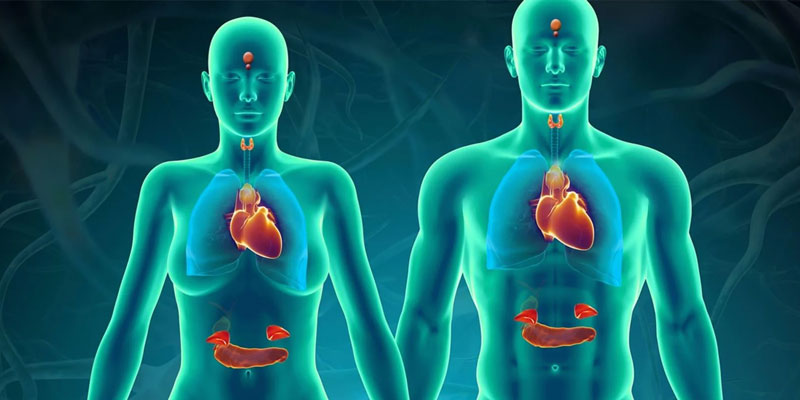
Hormones play an important role in the body. They are responsible for controlling and coordinating several bodily functions, such as metabolism, mood, growth, reproduction, sleep, reproduction, and sexual function. Endocrinology is the study of hormones, endocrine glands, and organs. Hormone-secreting glands and certain organs form the endocrine system.
As long as about 50 hormones work well, there is no cause for concern. However, when a problem arises, an endocrinologist treats the hormonal imbalance.
Endocrinologists are specialists in diagnosing and treating health conditions related to issues with body hormones, hormonal glands and related tissues. Endocrine glands that make hormones are as follows:
- Parathyroid glands
- Adrenal glands
- Pituitary gland
- Thyroid gland
- Pineal gland
Organs that make and release hormones are as follows:
- Hypothalamus
- Ovaries
- Testes
- Pancreas
Symptoms of Hormonal Imbalance
Here are some symptoms of hormonal imbalance:
- Heavy or painful periods
- Mood swings
- Insomnia
- Low libido
- Skin issues
- Unusual weight gain
- Headaches
- Fertility issues
- Vaginal dryness
- Weak bones
Specializations of Endocrinologists
An endocrinologist specializes in the following areas:
- Diabetes and metabolism
- Thyroid disease
- Endocrine oncology
- Neuroendocrinology
- Pediatric endocrinology
- Gender affirmation
- Reproductive endocrinology
- Endocrinology nuclear medicine
What do Endocrinologists Treat?
The endocrinologist treats the following conditions:
Diabetes and Metabolic Conditions
Endocrinologists develop treatment plans to treat metabolic conditions such as diabetes. Types of diabetes and other metabolic conditions are as follows:
- Type 1 diabetes (pancreas is not able to make insulin due to autoimmune attack)
- Type 2 diabetes (pancreas makes insulin, but the body isn't using it)
- Gestational diabetes
- Pancreatic diabetes
- Brittle diabetes (severe swings in blood sugar levels)
- Inherited metabolic disease
- Obesity
- Metabolic syndrome
- Latent autoimmune diabetes
Endocrine Cancers and Tumors
The endocrinologist treats the cancers or tumors in glands and organs. Different kinds of endocrine cancers and tumors are as follows:
- Neuroendocrine tumors
- Adrenal tumors
- Adrenocortical carcinoma
- Pancreatic cancer
- Parathyroid cancer
- Parathyroid tumors
- Pituitary tumors
- Thyroid cancers
Sexual Development, Function and Reproduction Conditions
Endocrinologists treat conditions related to the sex hormones that are associated with reproduction, sexual development and function.
- Erectile dysfunction
- Hormone-related infertility
- Ovarian cysts
- Hypogonadism (low estrogen and low testosterone levels)
- Menopausal disorders
- Polycystic ovary syndrome (PCOS)
- Growth hormone deficiency and excess (acromegaly or gigantism)
- Gynecomastia (enlarged breast tissue in males)
- Amenorrhea (absence of periods)
- Premenstrual syndrome (PMS)
- Sexual hormone disorders
Calcium and Bone Conditions
Endocrinologists treat the following conditions related to bone metabolism and calcium levels.
- Hypocalcemia (high level of calcium in blood)
- Hypocalcemia (low level of calcium in blood)
- Osteopenia or osteoporosis (reduced bone mass and strength)
- Vitamin D deficiency
- Metabolic bone disease
Thyroid Condition
Endocrinologists treat several conditions that prevent the thyroid gland from making a sufficient amount of hormones:
- Graves' disease (an autoimmune condition that causes hyperthyroidism)
- Hashimoto's disease (an autoimmune condition that causes hypothyroidism)
- Goiter (enlarged thyroid gland)
- Hyperthyroidism (high level of thyroid hormone)
- Hypothyroidism (low level of thyroid hormone)
- Thyroiditis (inflammation of the thyroid)
- Thyroid masses
- Thyroid conditions related to pregnancy
- Thyroid nodule
Visiting an endocrinologist is an outpatient procedure. The endocrinologist can ask questions regarding the issue. The endocrinologist may also ask about medical history and current medications. The doctor might perform a physical exam.
If you feel that hormones are all over the place and need personalized care, contact an endocrinologist at Matrix Hospital.
